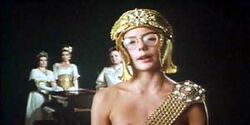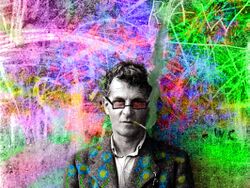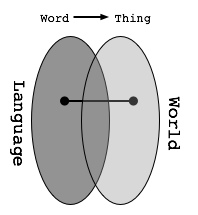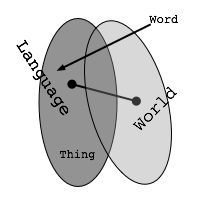Ludwig Wittgenstein
“His personality consists of two parts. The first I would purge, and the second I would date if I had the chance”
- ~ Josef Stalin on Ludwig Wittgenstein
Ludwig Hieronymus Kashmir Wittgenstein (26 April 1889 – 29 April 1951), known as the "Rock Star of Modern Philosophy" on account of his uncanny resemblance to David Bowie (see photo opposite. OK, neither do I.) and his habit of tearing up his notes at the end of his lectures (which he called 'gigs') and smashing his deck chair into splinters, sometimes over the heads of select and privileged members of the audience who would afterwards declare they had been 'bowled over' and ‘blown away’ by the sheer intellectual power of the man, when in fact they had all sustained brain damage.
Wittgenstein was an extraordinarily deep thinker whom no one, not even fellow philosophers, claimed to understand fully during his lifetime. This might have had something to do with his very strong Austrian accent but no one is sure.
Moreover, Wittgenstein is widely thought to be the greatest philosopher of the 20th century and his philosophical insights have a profound and incalculable significance for many different areas of human endeavor (e.g. gurning, charades, bee-keeping, self-flagellation, cutting toenails, ping-pong). On the other hand, he is thought by many door-to-door salesmen, greengrocers and other non-intellectual persons who have very little interest in or knowledge of philosophy to be a twentieth century Hungarian pianist. Some taxi-drivers (see below) interviewed as part of the very extensive and exhaustive in-depth research carried out for the purposes of this article confessed, rather shamefacedly, that they had never heard of him. So much the worse for them. Ignoramuses.
As all intelligent and well-informed people know, Wittgenstein, as well as being a lifelong enemy of all forms of intellectual snobbery, was the author of some of the most important philosophical works ever, which no one understood except for his now-dead students and a number of clones called 'Wittgensteinians', philosophical successors who dress exactly the way Wittgenstein used to (sports jacket, open-neck shirt, Lederhosen, high-heeled walking boots) and earn huge amounts pretending they understand his ideas through the "bewitchment" of language (by which he meant - er, see below somewhere). Further complicating the matter, all of these works except the last one ("Philosophical Invaginations", 1953) have now been demonstrated by precocious schoolchildren ("a six-year old child knows as much about philosophy as Wittgenstein" - Ronnie Tomkins, a 6 year old child) to have the truth content of a Tory Party election manifesto (i.e. roughly zero).
Wittgenstein's entire work is predicated on the question of the nature of language, something which intellectual luminary Bertrand Russell never got his mighty mazard around. Wittgenstein, who was nothing if not a realist and pragmatist, argued that the true meaning of all words is not to be found in any dictionary but in a golden casket kept in an underground vault somewhere in County Cork, Ireland by highly-evolved little green people from the Canis Major dwarf galaxy.
In addition to his philosophical talents, Wittgenstein was an amazing lover, prodigious onanist (he sometimes masturbated as many as 8 times in one day, thus earning himself the sobriquet of the ‘Complete Wanker’), had perfect pitch, and could whistle, unaccompanied, entire Bach concertos through his left nostril (he was less talented in the right which he used exclusively for blowing his nose). He gained a certain notoriety for being of a similar inebriate disposition to Schlegel, though his wrist-raising talents pale in comparison to those of Friedrich Nietzsche whose walrus mustache and luxuriant nasal hair could comfortably imbibe a whole litre of best Pilsener.
Biography[edit]
 |
| “ | So I asked her why she couldn't complete a simple logic truth table and she said it was because her brain wasn't in an advanced enough state of cognition. I did the logical thing... | ” |
—Ludwig Wittgenstein on why he broke that little girl's nose | ||
Young Wittgenstein[edit]
Wittgenstein: gay rights activist, pacifist, war hero, fashion icon, lifelong misogynist, manic depressive, rocket scientist, hermit, guilt-ridden onanist, semi-autistic nasal whistler, lavatorial architect, haunter of men's toilets, sadistic elementary school teacher, secular visionary, toilet humorist, philanthropist, crypto-communist, crypto-behaviorist, crypto-cryptologist: this remarkable and unique man was many things to many people in his lifetime - and only a few of the above (perm any 4 as you think fit).
Born in 1889 in Vienna, The Austro-Hungarian Empire, Ludwig Wittgenstein was the son of a famous Viennese iron and steel magnet and Simone Weil, a Christian Platonist, anarcho-syndicalist mystic and ruthless businesswoman, Wittgenstein was the 5th of thirteen brothers, all of whom (except himself) were named after famous homosexual Russian composers (Tchaikovsky I, Tchaikovsky II, Tchaikovsky III etc), and all of whom committed suicide in World War I (“the war to end all wars” until World War II, thought by many military historians to be far and away the best war ever and unlikely to be emulated, although world leaders are working on it). A 14th brother, the pianist-prodigy Paul Tchaikovsky XIII Sane-Wittgenstein Liebenstorm, lost both arms in a poker game on the way to a forced labor camp in Siberia, which misfortune did not deter him from composing a Piano Concerto in B Flat for Nose, Tongue and Stump, for which a piano with 3-inch wide keys had to be specially made, together with an alternate version for Two Left Feet, with Shortened Legs.
Considered ‘a total retard’ (in the politically correct language of the time) by his parents until, at the age of 7, he built a 50-foot high, fully-functional paraffin-powered space rocket out of paper clips and bits of scrap metal, Wittgenstein spent most of his childhood worrying about being a burgeoning pervert and Jew to boot. He was a Jr. High classmate of Adolf Hitler at age 14 at the Realschule in Linz, where he witnessed (for a small charge) young Addie fellating a German shepherd (canine not human) in the physics lab. From then on, Addie, badly bitten, and one bollock shy (yes, it is true, the Führer was unitesticular and died intestate), would not use the affectionate term "Du" for him, later writing about the impressionable and stuttering boy's inability to keep secrets in Mein Kampf ('English title: 'My Fascist Camp.'). In fact, Hitler's anti-semitism can be traced back to his school days with Wittgenstein, when Hitler became insanely jealous of Wittgenstein's physical resemblance to Rudolph Valentino and his spiritual resemblance to (the "Unborn") David Bowie, and especially jealous of his onanistic prowess, Hitler never managing to masturbate to his own final gratification more than three times a day.
The Wittgenstein family residence was at the centre of cultural life in Vienna and many famous and distinguished men would drop in for polite civilised conversation and to use their inside toilet. Among these were Sigmund Freud and Adolf Loos, the architect of modern functionalism. No one was ever quite sure what the two men did in the toilet together but they would spend as much as a quarter of an hour in it at a time. It was one of those things that could not be spoken about and so was passed over in silence.
After permanently alienating the great mathematician and logician, Gottlob Frege, at the age of 17 by defecating in his newly-blocked hat after an argument over the 7 times table, Ludwig spent the next two years camped outside Bertrand Russell's rooms at Cambridge University, constantly communing with nature and confessing to a local Catholic priest (though he wasn't a catholic); living on a diet consisting solely of cured pig scrotum, and taking long solitary country walks while working on revolutionary designs for a lead kite. Then, in 1914, he suddenly and unexpectedly joined the Cambridgeshire People's Republic of Swinging Bells and Balls, a local group of amateur campanologists and nudists.
Wittgenstein eventually worked up the courage to approach Russell who was soon persuaded that he was exceptional when he realized he didn’t understand a word he was saying. Wittgenstein asked Russell straight out whether he thought he was an idiot. To which Russell replied, “Why do you ask?” Wittgenstein said, “Because, if I am, I’ll become a philosopher, but if I’m not I’ll become an acrobat.” Russell said he was perfectly suited to being a philosopher.
Russell then suggested he write an essay during the vacation on a philosophical subject of his choice. Wittgenstein did so and when he had read just the opening sentences, which were:
- All women have vaginas.
- A vagina is not a penis.
- Only men have penises.
- Therefore no women can be philosophers.
he knew beyond a shadow of a doubt that he was dealing with a man of genius.
Various Wars and Interwar Periods, Also Hitler[edit]
In the trenches, Wittgenstein penned the greatest work of philosophy since Plato's The Laws of Sexual Attraction in the Oestro-Hungarian Republic, the Tractatus Illogico-Diplodocus. After the war he was awarded a doctorate on the strength of the Tractatus alone. He passed the oral exam needing only fillings to two upper and lower premolars and the extraction of an impacted wisdom tooth. Just two months later, he was awarded the Deck-chair of Philosophy at Cambridge largely on the recommendations of Russell and Eva Braun, with both of whom he was having very unplatonic relationships, the former in spite of the fact that he was often heard to say that he almost regarded Wittgenstein as a son.
Around this time, he was also invited to join the Vienna Circle by its two leading lights, Moritz Shrek and Rudolf Reindeer. This was a group of Austrian logical positivists, illogical negativists, and pseudo-Dadaists, who met every month to perform circle dances (hence the name) dressed as penguins in Lederhosen, and who took themselves very seriously indeed. He declined the offer, however, saying that though he looked good in leather, he had an aversion to penguins as a result of a bad sexual experience with the family butler in early childhood.
So, although they embraced Wittgenstein, Wittgenstein did not embrace them, or proposition them or go to bed with any of them because none of them were gay (and one of them was underage in any case, being only six years old).
Wittgenstein was an unusual man even by the extremest standards. A deeply humble man, he never dined at the High Table (where the messiest eaters among the teaching staff dined in high chairs) but preferred, dog-fashion, to eat out of a bowl placed on the floor.
Another strange idiosyncrasy of Wittgenstein was that whenever he disagreed strongly with something another philosopher had said to him, he would often roll about on the floor doubled up in paroxysms of hysterical laughter. After such treatment, many promising young philosophers were so humiliated that they gave up philosophy forever to become taxi drivers and greengrocers.
Wittgenstein soon became a legend for his incandescent laser-like intellect and revolutionary teaching methods particularly in his approach to seminars. An unconventional feature of these seminars was that they were held with the participants sitting in deck-chairs, their trousers rolled up to their knees, knotted handkerchiefs on their heads, while eating ice-cream cones. Wittgenstein claimed that this gave discussions a relaxed holiday atmosphere that was more conducive to clear, philosophical thinking. Wittgenstein himself, being the fashion faddist that he was, presided over the proceedings dressed in a two-piece navy blue bathing suit consisting of below-knee pants and elbow-length sleeves with contrasting color stripes down the center and the leg- and sleeve-edges, the whole ensemble rounded off with a red rubber bathing cap to protect his hair and matching red waterwings.
Russell once even suspected Wittgenstein of smuggling large exotic pets into the country. In his Autobiography he writes: “ I asked him to admit that there was not a rhinoceros in the room, but he wouldn’t.”
Then, after holding his post for just nine months, and giving just one confusing 5-minute lecture on fuzzy logic, he left Cambridge (after giving his employer five minutes notice) for the continent, where he remained until 1922. During this time, he taught Austrian school children advanced mathematics and sex education, his only reading being the Bible and de Sade.
Between 1919 and 1921, on weekend breaks from his teaching duties, Wittgenstein kept himself busy by designing and building an outside toilet for his sister’s mansion in Vienna. Two months after its completion, however, his sister called him back and requested him to move the entire structure 3 metres closer to the house, with the complaint that she was pissing herself every time just before reaching it. After making various helpful suggestions, Wittgenstein, at considerable cost, reluctantly gave in to his sister's importunity.
Then, in 1923, Wittgenstein, was eventually tracked down by Frank Ramsey who, after chloroforming him in an unguarded moment, put him in chains and brought him back to Cambridge where he was received by John Maynard Keynes who released him from his cage. He then dusted him off and sat him down before a select group of graduate students who, in such awe of the man's charisma, failed to notice that he was still coming out of anaesthesia as he kept repeating the words "Where am I? Who are these people?" throughout the entire 15-minute talk. On the strength of what was perceived as a virtuoso performance, Wittgenstein soon came to attract a cult following.
Wittgenstein's actions in Word War II merit special attention. He is thought by many (mainly lunatics), to be almost single-handedly responsible for the defeat of the Third Reich. Wittgenstein in fact went to kindergarten with Adolph Hitler. Although he had the opportunity, Wittgenstein did not kill Hitler, because Wittgenstein and Hitler were both five years old. Later in his life Ludwig came to bitterly regret missing his opportunity to 'whack Addie' (as he put it) and avoid World War II, the holocaust and other unnecessary unpleasantness involving the deaths of upwards of 70 million people. He would often go on and on about it for hours, mainly to himself in his own private language (which he called Ludwit and which he never fully mastered).
Relationship with Russell[edit]
Wittgenstein started his relationship with Russell on the bottom, as his student, but eventually wrestled his way out from under him in order to come out on top.
Wittgenstein Dies[edit]
“I will throw me into the River Cam. This is, of course, both true and untrue.”
- ~ Wittgenstein's (unsuccessful, both the note and the suicide attempt) suicide note, found plastered into his bedroom wall after his death.
Constantly surrounded by screaming mobs of bespectacled teenage boys until his death in 1951, Wittgenstein spent his time trying to write a book explaining why his previous book was complete and utter nonsense. This was a very productive activity, and today the majority of his writings exist in facsimile in the basement at Cornell University. The Complete Works are available under the title Everything I Wanted to Write But Couldn’t Be Arsed on CD ROM!, the monumental product of millions of man hours of painstaking scholarship by enslaved, sleep-deprived and sexually abused teenage boys who later grew into irreversibly damaged, psychotic men, but nevertheless all of whom remained fiercely loyal to Wittgenstein.
Of course Ludwig would say that death is just a form of conventional behavior, and is not an event in life but just throwing off one ‘form of life’ to engage in another that was a lot less fun. His final and poignant deathbed musings include: 'Tell them I've had a crap life.' 'I still can't figure out why that bloody lead kite never worked." "I wish I'd grown a mustache like Nietzsche', 'I wish I’d found the time to write my Bumper Book of Bloody Funny Austrian Jokes!', ‘I’d love to have one last wank but I don’t think I can manage it.' And 'Make sure that young brat Woody Allen doesn't steal all my ideas and get cheap laughs out of them'. And, with the ambiguity inherent in all language which he examined and explored more profoundly than any philosopher before or since: 'Tell Frege I'm sorry if he's still alive.'
Powers[edit]
| “ | Mercier: Do you really know what you know? Camier: Yes, but not to my knowledge | ” |
—Samuel Beckett on Wittgenstein's philosophy | ||
Ludwig Wittgenstein can change colors at will. He can also cause everything in reality (i.e. "The Set of All Real Things") to change colors while he remains stubbornly monochrome (except for his Ray-Bans). Paradoxically, to the observer these two acts are indistinguishable.
Ludwig Wittgenstein knows the true meanings of all possible words, and will show you where they are hidden for a small fee.
Ludwig has the power to command the attention of a roomful of female philosophers whenever he walks into a room naked (cf. The Philosopher's New Clothes).
Ludwig has the power to be wrong, change his mind, and be even more wrong than before, but in such an original way as to convince inferior philosophers that he was right all the time.
Ludwig has the ability to make economists think he's a deity.
Ludwig has the power to change entirely the way we all think (with the exception of Armenians) without our noticing it.
Ludwig has the power to teleport Heidegger's socks while he is still wearing them.
Ludwig is a "language-game" grandmaster. No one has beaten him yet.
Wittgenstein has also given us a new word in the philosophical lexicon, namely the verb: to Ludwit, which means to talk to oneself (aloud or silently, it doesn't matter) in a self-made private language that no-one, not even oneself, properly understands but which contains the secret of all synthetic a priori truths.
Philosophy[edit]
“A bunch of brain-dead idiots trying to solve a load of non-problems. ”
The "Early" Period (1889-1923)[edit]
So stupid were all philosophers before him, that they were unable to ascertain the real relationship between words and things. This is what Ludwig pointed out with such devastating simplicity and insight in the Tractatus. i.e.,
This simple mapping is so obviously correct even to the feeblest intellect (i.e. an Oxford philosopher's), that it makes anyone wonder why they didn't think of it hisselves (or herselves) (this is another purely grammatical remark).
The "Kindergarten" Period (1923-1929)[edit]
Having permanently solved all past and future philosophical problems, Wittgenstein decided to start his retirement early. He did some work on the side here and there, including teaching kindergarteners at a local school. The stress began to set in when he decided to teach them algebraic geometry. When they failed to grasp it, Wittgenstein, his intellectually uncompromising attitude taking no account of age groups like infancy and childhood, steadfastly refused to switch to teaching addition and subtraction.
The "Middle or Painful" Period (1929-1935)[edit]
After returning to Cambridge in '29, Wittgenstein found himself unable to achieve intellectual clarity. What is the meaning of a word? What is the meaning of meaning? What is the meaning of being? These meaningless thoughts tormented him and caused him much intellectual pain and suffering. Suddenly things began to seem much less certain. In his own words, Wittgenstein was in a "bloody mess".
The "Late" Period (1935-1946)[edit]
Around 1935 Wittgenstein finally began to develop the style and clarity that would allow him to complete his Theosophical Investigations. The "remarks style" or "notes style" combines a series of short paragraphs "going every which-way, going nowhere" (TI Preface). Take, for example, the following three famous passages:
- "Five red apples." (TI 1)
- No!
- Water!
- Ouch! That didn't hurt
- Away! (TI 38)
- Forming and testing a hypothesis—
- Making up a story; and reading it—
- Singing catches—
- These, and other things, are called "language." (TI 23)
"I admit the prose could be more concise," Wittgenstein once remarked to his student, Ifor Redback.
The "Really Late" Period (1946-1951 and after)[edit]
The last five years of Wittgenstein's life are a mystery wrapped in a riddle wrapped in an enigma wrapped in a brown paper bag that is still being investigated. He is thought by some to have spent them in an attempt to refute Leibniz's theory that the universe consists of a substance called 'gonads' and prove that, in his words, it is 'a load of balls.' Others speculate that he occupied himself in writing a primer in quantum theory for 7-10 year-olds. He is supposed to have written this lost masterpiece in a tower he had designed and built himself in County Cork, Ireland, and which was three inches shorter than he was in order to save on space and materials.
The "Dead" Period (1946-1951 and after and after)[edit]
Following Wittgenstein's death, noted philosophers continued to talk about his work, even though he wasn't even there to defend it. Some believe that this may have hurt his feelings had he been alive, as he never achieved the widespread agreement and consensus that all philosopher crave. Some say that his ghost still lingers the hallowed halls of universities, and that it rises every time an arrogant philosophy undergraduate thinks they have found a flaw in the Tractatus.
Quotations[edit]
Selected Aphorisms and Idiotisms from the Tractatus Illogico-Diplodocus[edit]
- 1 The world is whatever is in my briefcase.
- 1.1 It would, so to speak, appear as an accident, if something were not in the briefcase. (Where else would it be? Might I have left it in a public convenience after a sexual encounter?)
- 1.2 What is in the briefcase is the structure of the proposition.
- 1.21 Logic concerns the structure of the world (C.f. Hertz's mechanics). To learn this structure we should have to step outside the world; i.e. outside the briefcase.
- 2 The limits of my briefcase are the limits of my world.
- 3.112.32.23.47.22 If the series x,Ω'x,Ω'Ω'x,Ω'Ω'Ω'x,... was in my briefcase, there would not be any room for the cutthroat razor William of Occam gave me for my birthday.
- 3.112.322.347.221 In taking Occam's Razor out of my briefcase, i.e. out of the world, and a fortiori, prima facie and QED outside logic, I could then, and only then, show that I had shaved myself and not shaved myself (including my legs) at the same time – and nobody else either, including Russell.
- 3.14.15.926.19.716.939.937 Death is not an event in my life. It is so to speak a non-event outside my life and therefore a bummer to be avoided at all costs. Our life is infinite the same way that my briefcase has room for my sandwiches, my limitless ego, and the rhinoceros I kept in my room which Russell never managed to find.
- 1.2.34.56.9 Perhaps there is a great mind like mine out there in a parallel universe who has had the same thoughts that I have had (though it is unlikely because I am almost certainly unique in all possible universes) though it is possible there is an anti-matter version of myself with whom I could join forces and solve all the philosophical problems in all possible universes and thus render philosophers unnecessary (and oblige them to get proper, useful jobs i.e. as plumbers or gardeners) which would constitute an inestimable blessing and service to the entire human race on planet Earth as well as to other intelligent species throughout all universes.
- 5 My propositions are elucidatory in this way: he who understands me finally recognizes both myself and them as senseless, when he has climbed to the top of the ladder. (He must kick away the ladder, after he has climbed up on it, being careful not to kill himself.) However, he must first mount the ladder - but certainly not in any sexual sense - then he sees the world rightly.
- 6 Once I have climbed the ladder and cleaned the windows of perception, then I can see the world as it really is and spy on the people inside.
- 7 Strive not to shit higher than thine own arse.
- 8 Comment 8 (involving as it did explicit references to public acts of gross indecency with members of the genus equus) was removed by the publishers under section 6 of the Obscene Publications Act, 1857.
- 9 Whereof one cannot speak (for fear of censorship), one must simply use sign language (or sing).
Selected Passages from the Philosophical Invaginations[edit]
- If a Panda could talk, we wouldn’t understand him, particularly if he spoke very indistinctly in Mandarin Chinese while chewing a bamboo shoot.
- If a lion had a thorn in his paw, how would he make this known to us? Would we understand him?
- What if he said: "My paw is hurting! Please help me!"? This is the sort of thing that could happen. If we are intelligent, we might say to the lion: "You must remove it yourself." For it might be a ploy to get us to try to remove it and so kill us and eat us. Of course, this might not occur to many philosophers. (4)
from Everything I Wanted To Write But Couldn't Be Arsed on CD ROM![edit]
- Every won of we are (is?) struggling with language und grammar (this is an example of an ungrammatical remark).
- I especially with language a loosing battle struggling am. (EIWTWBCBA! 402)
- We could say that a 'lanyard', in so far as it is a word in the dictionary, is related to 'knots' in a way that knots('knots') is hetero-logically sound. A grammatical remark: there could be a genitalic 'root' that could be said to fail only in so far as it fails to do its work in the bushes (a book of jokes)!
"How to Teach Kids" from The Teaching of Students, and some Red Marks[edit]
- If I have the class of all classes, does it belong to me or only to itself?
- In the case of a difficult pupil, the thumbscrew should only be a last resort.
- For every person like myself wanting to teach, there are thirty children not wanting to be taught - or punished.
- A teacher should never lose his temper in front of the class. He should take the dimwit or annoying troublemaker concerned into an unused classroom and then lose it without fear of being observed.
- Teaching children is a battle against the bewitchment of my intelligence by means of stupidity.
Bibliography[edit]
- Tractatus Illogico-Diplodocus, 1922
- "You're All Bloody Idiots: Some Remarks on Ethics", Proceedings of the Aristotelian Society 1930
- The Teaching of Students, and some Red Marks, 1940.
- On Certainty, 1942
- Quite Possibly On Certainty, 1943
- Maybe On Something Like Certainty, But I'm Not Sure, 1944
- Finally Certainly on Certainty and Uncertainty!, 1945
- Bacterial Culture and Use Value, 1950
- Remarks on the Foundation of all Possible Outside Toilets, 1923
- The Blue and Brown Books and the Green Book with a Pretty Pink Ribbon Around It, 1952
- Miscellaneous Ungrammatical Remarks on Grammar, 1960
- Various Phenomenally Intelligent Remarks on Miscellaneous Ungrammatical Remarks on Grammar, 1962
- The Yellow Book, 1953
- The Little Black Book, 1954
- The Purple People Eater Book, 1955
- Pictures Of Things, 1959
- Remarks on Grammar, 1960
- Remarks on Remarks on Grammar on Remarks ... ad infinitum, 1962
- Grammatical Remarks, 1970
- Grammatical Remarks on Moore's "I Know This Is My Arse" with Special Attention to Russell’s commentary on Aristotle’s Posterior Analytics', 1975
- Family Resemblances: The Wittgenstein Clan-Incest Photo Album, 1976
- Private Language (privately published notes to self--no translation has been possible), 1979
- Zelig (posthumous collaboration with Woody Allen), 1983
- The Investigations
- Theosophical Investigations (alternate title: Philosophical Invaginations), 1953
- More Theosophical Investigations, 1958
- Some other Theosophical Investigations, 1961
- Yet another volume of Theosophical Investigations, 1967
- Philosophical Invaginations: Greatest Hits, 1977
- Philosophical Invaginations: The Complete Collector's Edition (with Wittgenstein action figure in black latex), 1977
- Everything I Wanted to Write But Couldn't Be Arsed on CD ROM!, 2000






